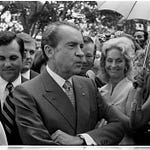Did the American Founding Fathers support the Electoral College?
Days at elk camp are long. We rise in the wee hours of the morning and hike with headlamps through the mountains in the dark to be where we think elk will be at first light. At the end of the day, we wait where we think the elk will be at last light and hike out with headlamps. We meet at camp at night to share our experiences, food, and drink. Success in the field probably means your group is the last to return to camp, but no one sleeps until everyone returns.
Over food and drink, we catch up. Several camp veterans won’t have seen each other in a year or more. We share pictures of kids and talk about life changes.
We chat generally about anything. We rarely talk about religion, but we talk about God and existence. And we talk about politics.
We don’t all agree on every topic, and there are some strong disagreements. But we accept each other's views, communing over beer and food. We know that the next day, the person you share your disagreement with will help you carry out a heavy load, and they’ll wait for you to return to camp to go to sleep.
A topic at camp this year was representative government. One of the hunters lives in a rural area in a populous eastern state dominated by city politics. He expressed frustration because the city negates the state's interest in the rural area.
The issue at hand is a critique of “winner-take-all” state election systems. In a winner-take-all system, the candidate who receives the majority of the popular vote in a state wins all of that state's Electoral College votes. If cities vote differently than rural areas, the city still dominates the state’s electoral choice. States prefer this approach as it gives their preferred candidate the maximum advantage. In 1800, only two states had a winner-take-all system. By 1836, all states except for South Carolina used a winner-take-all system. Today, all states except for Maine and Nebraska use a winner-take-all system.
For all the critique of the Electoral College, a winner-take-all system equally undermines the democratic principle of one person, one vote. It distorts the national popular will. Those who argue that “land doesn’t vote, people do” often still support a state winner-take-all system, negating the rural influence in their own state. The result of both winner-take-all and the Electoral College is to amplify the power of swing states.
Because there’s nothing new under the sun, this issue has been hotly debated since America was born at war and by none other than the brilliant primary framer of the Constitution and later President James Madison.
August 23, 1823. A letter from James Madison to US District Judge George Hay
James Madison was the primary framer of the US Constitution and a driving force behind the 1787 Constitutional Convention, which created the structure of the American government. His detailed notes from the convention are the most complete of any delegate.
Following the convention, Madison wrote 29 of the 85 Federalist Papers to explain the Constitution and convince states to ratify it. When the states refused to ratify the Constitution without explicit protections for American individual liberty, Madison was the primary author of the Bill of Rights. These amendments protect the liberty of citizens and states.
In short, Madison was central to the creation and ratification of the Constitution. He served the nation as a Congressman, Secretary of State, and was later the fourth President of the United States, serving in that capacity from 1809 to 1817. He was a staunch advocate for states' rights and a rational pragmatist. He recognized that while a states’ rights approach has strong merits, there are practical limits that sometimes necessitate federal intervention.
At the Constitutional Convention, Madison recommended using the national popular vote to decide the office of President. He stated that "the people at large was…the fittest" to choose the executive. But his perspective changed over a lifetime of national service.
In an 1823 letter to George Hay, Madison discussed a potential Constitutional amendment: district-based voting to select Presidential Electors instead of the current Electoral College system. He reflected on the 1787 Constitutional Convention's difficulty in determining a method to elect the President. He acknowledged the compromise that led to the Electoral College system, which was influenced by the need to balance the interests of small and large states and strongly influenced by slave states. He mentioned that the compromise agreement became necessary due to time pressure and the long deliberative process.
Madison suggested that the Electoral College was an imperfect solution.
Towards the end of the letter, Madison outlined his proposal:
Electors should be chosen by districts… If no candidate achieves a majority… the President should be chosen by a joint ballot of both Houses of Congress
Madison’s proposal identifies that each voting district should cast its own vote for the president. Instead of the winner-take-all system or the current Electoral College system, voting districts should each have their vote counted.
In the letter, Madison also doesn’t explicitly discuss the concept of a direct national popular vote for electing the President. Instead, he focuses on the mechanics of the Electoral College and the potential benefits of district-based voting. Madison critiques the current Electoral College system, particularly emphasizing the shortcomings of the winner-take-all approach and the disproportionate influence it can grant to smaller states or individual electors.
Madison’s discussion is more about improving the representational fairness of the Electoral College rather than advocating for a shift to using the national popular vote directly for electing the President. He suggests reforms that would make the Electoral College better reflect the diverse preferences across different regions of the states, aligning Electoral College outcomes more closely with popular vote distributions within those states. His proposal aims to balance the representation of smaller and larger states and address the issues that arise when a few electors or a small number of densely populated areas can determine the majority of electoral votes for an entire state.
As a strong supporter and advocate of a democratic republic and states’ rights, Madison grew to recommend not abandoning the flawed Electoral College but making the system more closely represent the vote of the populace.
So, Why do we have the Electoral College?
Slavery shaped the structure of the Electoral College during the Constitutional Convention of 1787 due to the significant political and economic divisions between slave-holding and free states.
Slave-holding states were concerned about their political influence under a direct national popular vote system. The South had large populations, but a significant portion of those populations were enslaved individuals who had no voting rights. In a popular vote system, these states would have less voting power than the more populous free states if the president were elected purely by the popular vote of free citizens.
To reach a compromise, convention delegates agreed on the Three-Fifths Compromise, which counted three out of every five slaves as people for congressional representation and taxation. The Electoral College agreement gave Southern states more electoral power than they would have had if slaves were not counted at all.
The Electoral College was also a means for Southern states to influence presidential candidates. Under the compromise agreement, these states could push candidates to consider Southern interests, particularly the preservation of slavery, to seek support from Southern electors.
Right or wrong, the Electoral College helped maintain the union of the states by giving each state—regardless of North or South, large or small—a proportionate influence in the electoral process. It also perpetuated slavery.
Did the American Founding Fathers support the Electoral College?
The American Founding Fathers supported a democratic republic and representative government.
At the Constitutional Convention, James Madison himself recommended using the popular vote to determine the president. But the Founding Fathers could reach no such agreement. The Electoral College was a compromise that became necessary for slave-holding states to agree to the method of selecting a President.
Madison had a different recommendation after serving as Congressman, Secretary of State, and President.
We should keep the Electoral College districts, but instead of a winner-take-all system that disregards the one-person, one-vote principle, we should tally each voting district’s vote individually.
It's a compelling idea from one of America’s greatest leaders, who dedicated his lifetime in service to the nation.
May God bless the United States of America.















Share this post